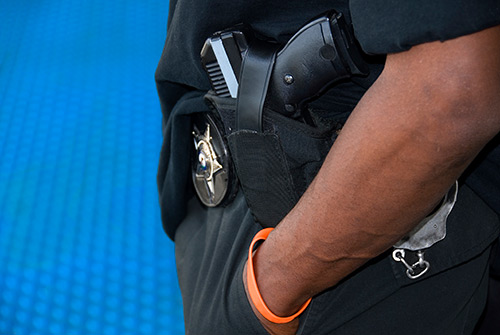
Do we need guns in church?
In the wake of the mass murders at Sandy Hook Elementary School, people are more sensitive to the importance of good security measures at schools, churches and other gathering places. At the same time, gun control and the Second Amendment continue to be hot topics of debate.
Security consultant Carl Chinn says faith-based organizations “must increase their awareness of, and preparation for, the accidental, criminal, and environmental hazards capable of compromising their primary ministry purpose.”
Chinn works for LONG Building Intelligence, a company that provides technical security solutions for commercial facilities in Colorado. In 1996, he was part of the security force at Focus on the Family when an armed intruder took hostages. Following that experience, he began researching violence at churches and faith-based ministries. His writings have been featured in Christianity Today, the Washington Post, the 700 Club, Preaching Magazine, and Focus on the Family.
What is the best and safest way to provide security? Chinn advises churches without security to “keep it simple, but get it started.” Congregations vary in their approach to providing security for church members. Some employ off-duty police officers. Others have a security team and a plan for dealing with intruders. A number of congregations depend on members who have permits to carry concealed weapons.
According to USA Today, “About every two weeks in the United States, four or more people (not including the killer) die in a mass killing. As frequent as they are, however, mass killings make up only about 1 percent of the roughly 15,000 people murdered each year in the U.S.”
Some people want legally armed people in the congregation for security. Others do not want guns in churches at all. Larry Dickey, pastor of First Baptist Church, Sunizona, Ariz., carries a concealed weapon into the pulpit each Sunday. David Crosby, pastor of First Baptist Church, New Orleans, thinks that worshipers carrying weapons is “a more dangerous scenario than what I have experienced thus far in 40 years of being a pastor.” New Orleans has the highest per-capita murder rate in the nation.
Arkansas recently passed a bill allowing concealed handguns in churches unless the congregation bans weapons. South Carolina’s “Law Abiding Citizens Self-Defense Act” makes it illegal to carry a concealed weapon on church grounds “unless express permission is given by the appropriate church official or governing body.” At the conclusion of 2012, there were 187,327 concealed weapons permit holders in South Carolina, according to SLED.
Nationally, Chinn says the year-to-year statistics consistently show that “fewer people die when there is somebody ready in the building.”
Jimmy Meeks, an SBC preacher and Texas police officer, trains security people to properly handle firearms. He approaches the idea of members carrying weapons to church cautiously. “If you don’t practice, you’re gonna hurt somebody,” he said. “If you are not willing to get training, you’d better leave that gun at home, or better yet, don’t buy one to begin with. If you miss the guy that came into church with the gun, there’s a good chance you’ll hit the man behind him or the woman behind him.”
Mass shootings are rare, but not as rare as they used to be. Church shootings are even more rare, but they do happen. As churches struggle with how to provide the safest environment possible, the question of armed members continues to be a point of debate.
Few debate the need for some type of security. Statistically, the chances of a shooting in a church are very small. Death statistics for 2006 to 2010, kept by the U.S. Centers for Disease Control and Prevention, indicate that more people died from migraine headaches or sunstroke than were murdered by mass killers.
Do we needs guns in church? The Courier would like to hear from South Carolina Baptists on this issue. Please take our survey below.
– With reporting from Baptist Press.
Create your free online surveys with SurveyMonkey, the world’s leading questionnaire tool.
